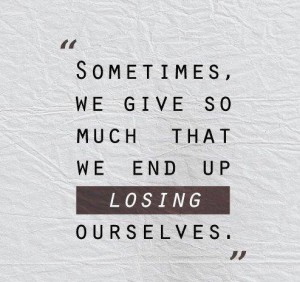![Zan_Zig_performing_with_rabbit_and_roses,_magician_poster,_1899-2[1]](https://donovandejong.com/wp-content/uploads/2013/12/Zan_Zig_performing_with_rabbit_and_roses_magician_poster_1899-21-201x300.jpg) I’ve spent my whole life trying to find out who I am. Trying to draw the line in the sand between being a yes man, always taken for a ride, and being a selfish person who doesn’t experience the joy of giving.
I’ve spent my whole life trying to find out who I am. Trying to draw the line in the sand between being a yes man, always taken for a ride, and being a selfish person who doesn’t experience the joy of giving.
I also used to be someone who felt obliged to offer advice, even when having no experience in the matter, because I wanted to help everybody (and I believed I was always right, which is another story entirely).
Now I share my experiences in the hope that they may be of help, but I’m also not afraid to say “That’s not something I have any experience with”.
It took a long time to realise I will not always be the right person for the job.
And that’s ok.
It’s sometimes hard to find that balance. To share yourself with others easily and comfortably, yet still remain on your own path, within your own boundaries, and in control of your own life.
It took me a fair while to realise that who I “should be” was irrelevant.
Should be? According to whom?
It took me a fair while to realise I can’t be the perfect mentor or leader for everybody.
Perfect? That’s ego telling me I should be something that doesn’t exist.
By being true to ourselves, and leading by example naturally without the ego (or as best as we can at any moment ;)), we’re able to relate to and support others more effectively.
You can’t be there to support others if you’re not OK first, and it’s not always easy to admit to yourself that you’re not OK.
“You can learn great things from your mistakes when you aren’t busy denying them”
So I tried to give my all to be there for everybody, all the time, and ended up frazzled. Exhausted.
Lost.
 I had to work through the feelings of guilt that appeared when I wasn’t able to help others, and had to be selfish and say no.
I had to work through the feelings of guilt that appeared when I wasn’t able to help others, and had to be selfish and say no.
I hated saying I couldn’t help.
Then, with the council of a close friend and a good chat about my perspectives, I came to a realisation.
By thinking I was responsible to help everybody, I wasn’t able to help anyone very effectively.
By spending some time getting in touch with myself and thoroughly understanding my core values, I’ve begun to create a solid foundation of knowledge to stand on.
I now understand what I’m able to share.
It’s not about who I want to be. It’s about who I always was.
It’s an amazing feeling to understand your deepest beliefs and values. After a bit of soul searching, I reached a pivotal point where I no longer neglected myself while struggling to help everybody.
I now understand my boundaries. Those fantastic invisible lines that I never knew how to define to anyone, which led to them being crossed quite easily.
Now I know the lines. I communicate the lines with confidence and clarity.
Two things come in to play here:
1. Knowing and understanding yourself.
Without knowing your boundaries, the lines get blurred. You can’t send a message if you don’t know what the message is. It’s easy sometimes to lay blame on the other person, but you need to first understand what you want, so you then know what you don’t want.
Spend some time and think about what you like, what you don’t like, what your goals and dreams are, and what your goals and dreams are not. Once you know what you don’t want, stand up for yourself when you need to and say it.
Openly, and honestly.
This allows you to explore the path toward what you do want.
2. Clear communication.
This really is key. Once you know your decision, communicate it.
Clearly and simply.
Until it’s understood.
This would previously manifest in my life as a lack of confidence on my behalf, unsure of how to react or deal with any given situation. Awkward moments where I thought to myself, “why did I do that? I don’t think really wanted to do that”. Whenever there was a misunderstanding and I felt awkward about the situation, my mind would rationalise it:
“I didn’t hear what they said properly..” or “I didn’t really need that item”.
 Don’t allow anyone to push you into a corner you don’t want to be in. If you’re feeling tension or stress about a situation, it’s most likely because you’re heading down a path you don’t want to be on, and you already know what the answer is.
Don’t allow anyone to push you into a corner you don’t want to be in. If you’re feeling tension or stress about a situation, it’s most likely because you’re heading down a path you don’t want to be on, and you already know what the answer is.
Take control and change it. Be confident in expressing your truth clearly and openly.
Honesty and transparency are the keys to clear communication. To be honest about something to others, you need to first be honest about it to yourself, and that’s the hard part.
“If you tell the truth, it becomes a part of your past. If you lie, it becomes a part of your future.”
Now that I’ve started down the path of understanding myself on a deeper level, I’m travelling toward a place of calm. A place where I know what the truth is, I know what my answer is, and can more clearly let others know how I feel. There is no guilt or awkwardness associated with saying “Sorry, I didn’t hear what you said” as many times as needed to for the message to be clear, or “Sorry no I would like to keep this, thanks” if I don’t actually have enough to share.
Strangely enough, now that I have this confidence in what I can share of myself, I haven’t really found a situation where I don’t have enough to share.
Have you been in a situation before where it didn’t go the way you hoped it might, and you realised you weren’t being completely open and honest about how you felt?
As always with all of these experiences, practice makes perfect, and I’m getting better at it each day 😉
Always love reading your posts Donny <3 thank you for sharing!